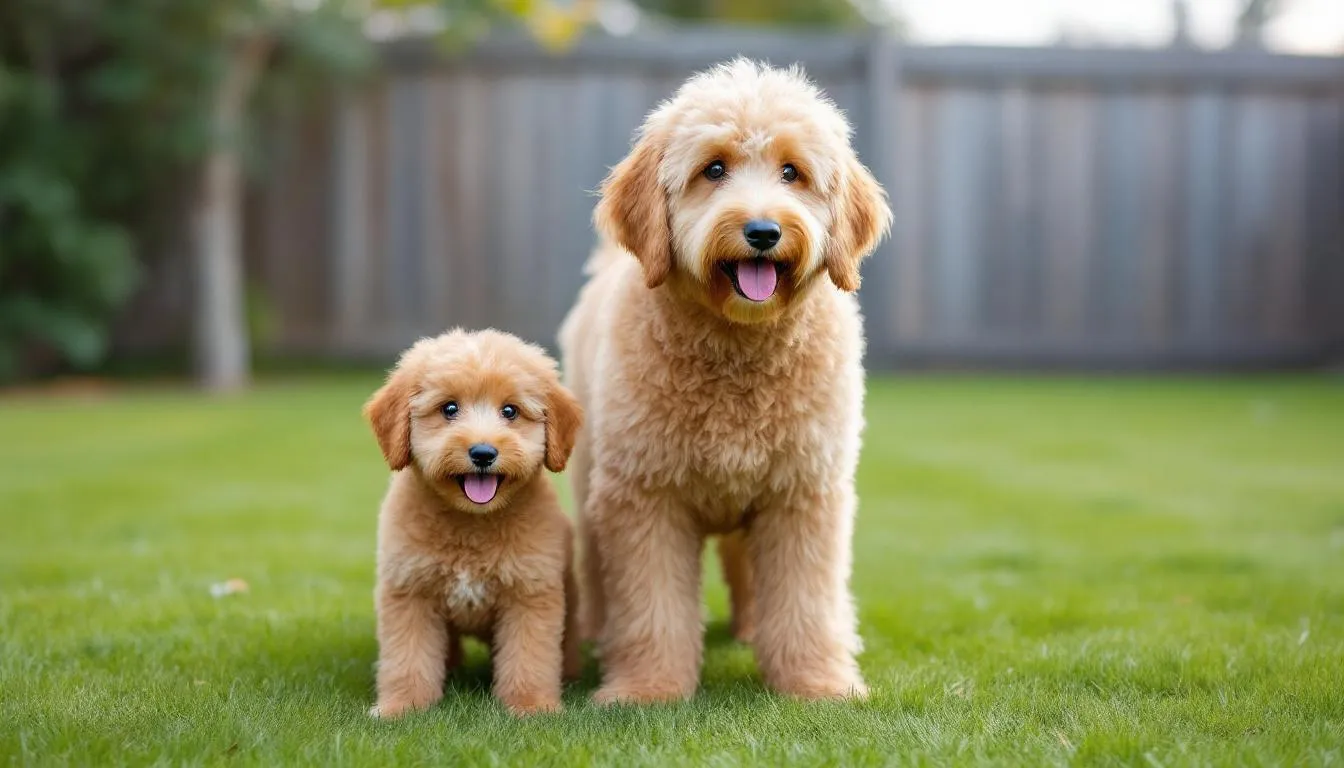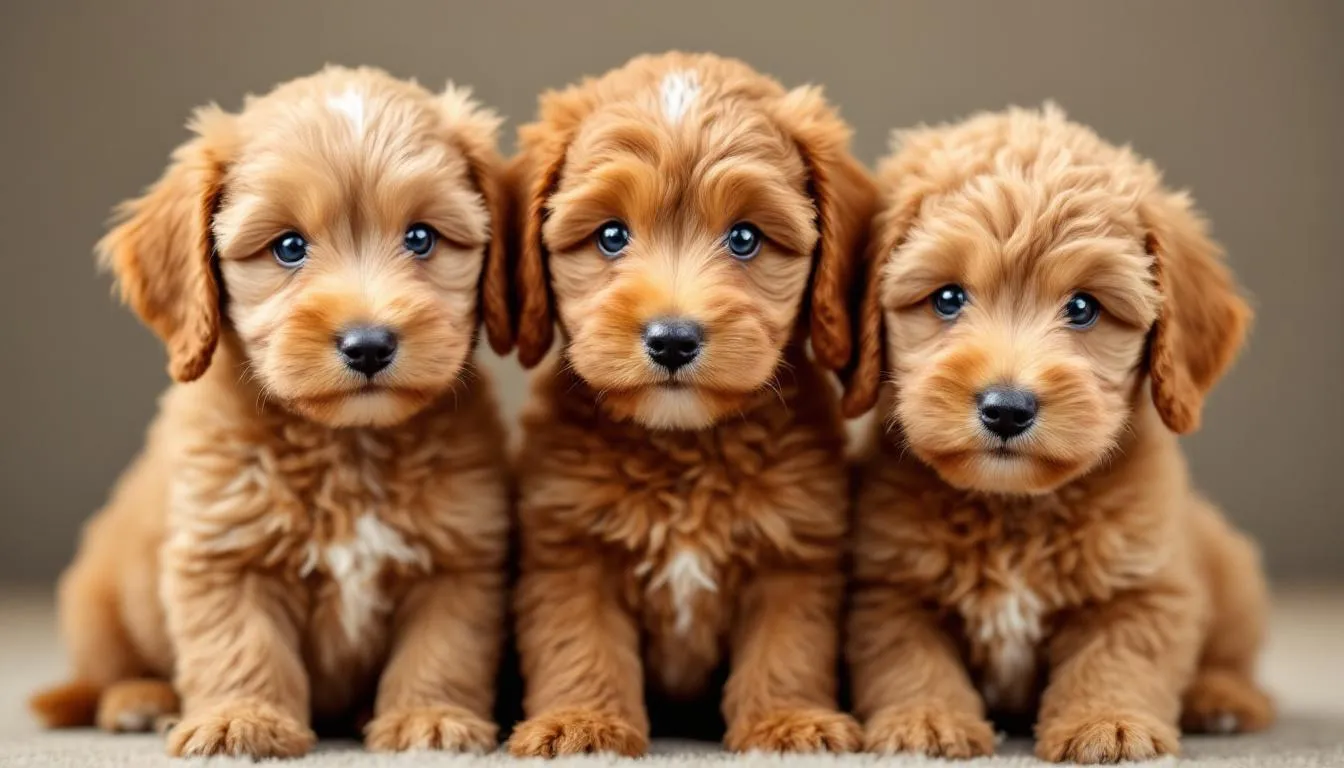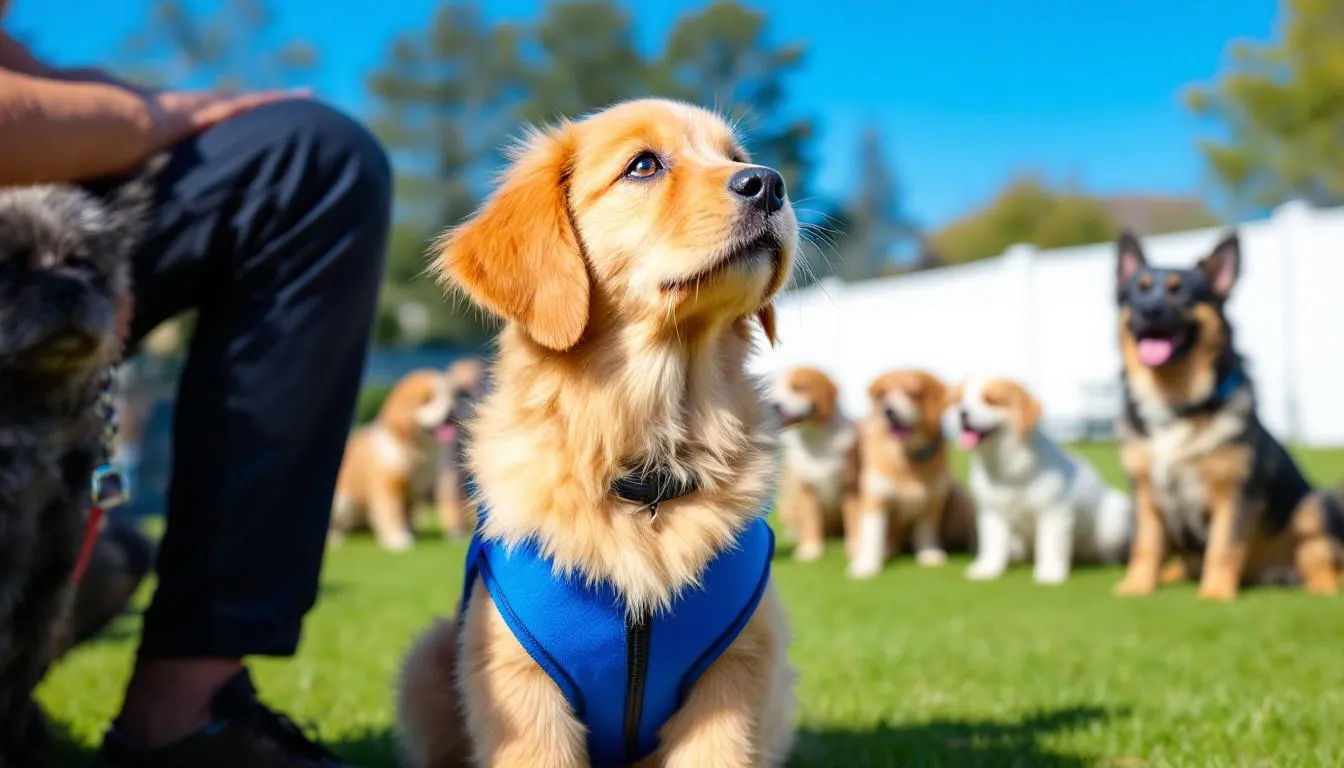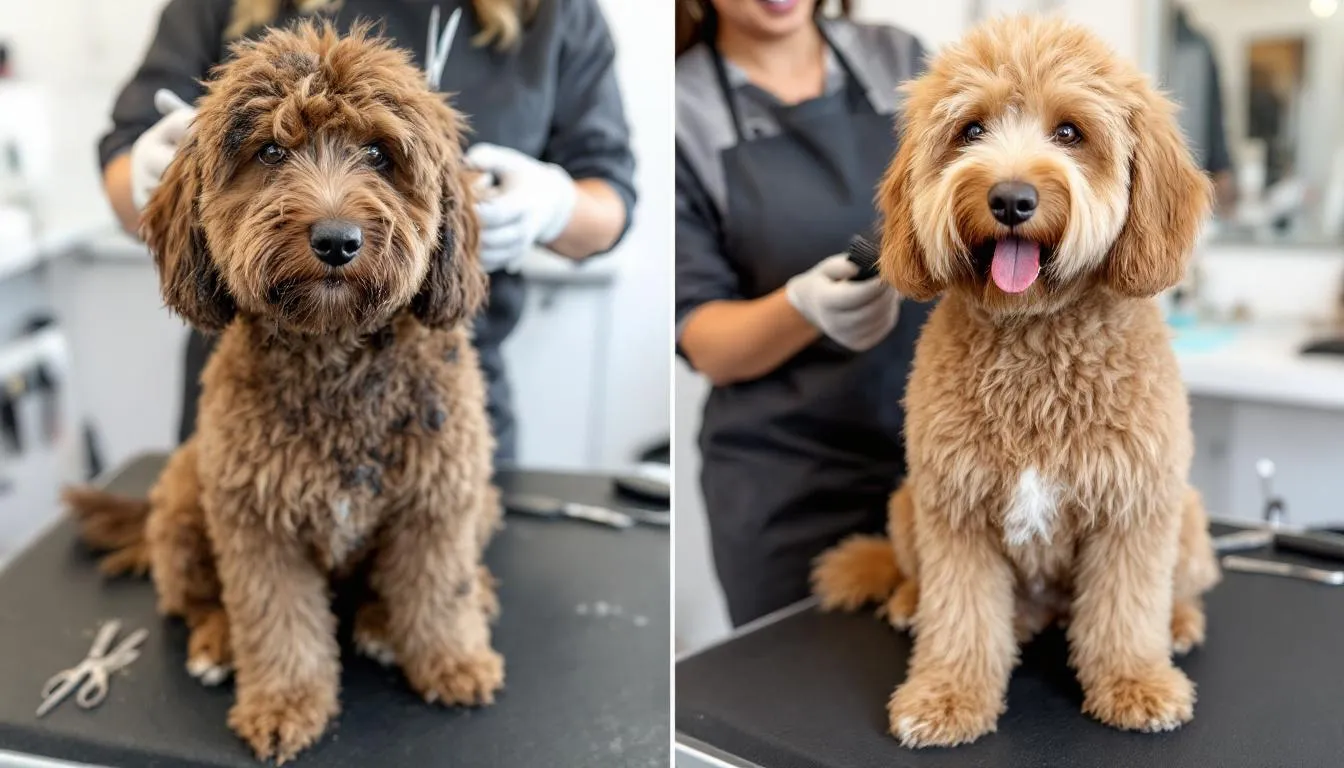

Key Takeaways
Small Golden Doodles are a crossbreed between golden retrievers and miniature poodles, weighing 15-35 pounds and standing 13-17 inches tall
- Small Golden Doodles are a crossbreed between golden retrievers and miniature poodles, weighing 15-35 pounds and standing 13-17 inches tall
- They feature low-shedding, hypoallergenic coats in various colors and textures, making them ideal for allergy-sensitive families
- These intelligent, gentle dogs are excellent family pets with 12-16 year lifespans and minimal barking tendencies
- Regular grooming, daily exercise, and mental stimulation are essential for their health and happiness
- Prices typically range from $1,600-$4,500 depending on breeder reputation, health testing, and puppy characteristics
- Mini goldendoodles are expensive due to careful breeding, extensive health testing, and high demand for this premium hybrid
- Mini goldendoodles are known for their friendly temperament, intelligence, and hypoallergenic qualities
They feature low-shedding, hypoallergenic coats in various colors and textures, making them ideal for allergy-sensitive families
These intelligent, gentle dogs are excellent family pets with 12-16 year lifespans and minimal barking tendencies
Regular grooming, daily exercise, and mental stimulation are essential for their health and happiness
Prices typically range from $1,600-$4,500 depending on breeder reputation, health testing, and puppy characteristics
Mini goldendoodles are expensive due to careful breeding, extensive health testing, and high demand for this premium hybrid
Mini goldendoodles are known for their friendly temperament, intelligence, and hypoallergenic qualities
Looking for a gentle, intelligent companion that won’t trigger allergies or overwhelm your living space? The small golden doodle breed might be exactly what you need. These charming mixed breeds combine the best traits of golden retrievers and miniature poodles, creating dogs that are both family-friendly and apartment-appropriate.
This complete guide covers everything you need to know about mini goldendoodles—from their origins and physical characteristics to daily care requirements and finding reputable breeders. Whether you’re a first time dog owner or adding to your pack, understanding these designer dogs will help you make an informed decision about welcoming one into your home.
What is a Small Golden Doodle and Miniature Poodle Mix?
The small golden doodle is a dog breed that represents a deliberate crossbreeding effort between a purebred golden retriever and a purebred miniature poodle. This dog breed is known for its unique characteristics, such as a friendly temperament, intelligence, and a hypoallergenic coat. This hybrid mix emerged in the mid-1990s when breeders sought to create family-friendly dogs with the golden retriever’s gentle temperament and the miniature poodle’s hypoallergenic coat qualities.
Mini goldendoodles are created by crossing two purebred dogs: a golden retriever and a miniature poodle. This makes them a hybrid resulting from the combination of a retriever and a miniature poodle, which influences their size, appearance, and temperament.
Alternative names for this hybrid breed include:
- Mini goldendoodle
- Miniature goldendoodle (miniature goldendoodles is a commonly used term for this dog breed)
- Mini doodles
- Small goldendoodle
Mini goldendoodle
Miniature goldendoodle (miniature goldendoodles is a commonly used term for this dog breed)
Mini doodles
Small goldendoodle
The popularity of these dogs has grown exponentially, particularly among families seeking therapy dogs or companions for very young children. Their gentle nature and manageable size make them ideal for households that want the golden retriever temperament without the space requirements of a larger dog.
Understanding the genetic history of mini goldendoodles helps predict their inherited traits, coat type, and potential health issues, providing valuable insight into their care and suitability as pets.


Size and Physical Characteristics
Mini goldendoodles range from 13-17 inches tall at the shoulder and typically weigh between 15-35 pounds at maturity. This size makes them significantly smaller than standard goldendoodles, which can exceed 51 pounds and stand over 20 inches tall. The mini poodle is the parent breed responsible for the smaller size in mini goldendoodles, while the standard poodle is used to produce the larger standard goldendoodle varieties.
Several factors influence their final size:
- Miniature poodle parent size : Smaller poodle parents generally produce smaller offspring
- Generation type : Later generations tend to have more predictable sizing
- Genetic makeup : Individual genetic variations can affect growth patterns
Miniature poodle parent size : Smaller poodle parents generally produce smaller offspring
Generation type : Later generations tend to have more predictable sizing
Genetic makeup : Individual genetic variations can affect growth patterns
Physical features that define the breed include:
|
Feature |
Description |
|---|---|
|
Ears |
Floppy ears that hang close to the head |
|
Eyes |
Typically brown, expressive eyes |
|
Build |
Well-proportioned body with athletic capabilities |
|
Gait |
Often exhibits the elegant poodle movement pattern |
Feature
Description
Ears
Floppy ears that hang close to the head
Eyes
Typically brown, expressive eyes
Build
Well-proportioned body with athletic capabilities
Gait
Often exhibits the elegant poodle movement pattern
The compact size of mini goldendoodles makes them perfect for smaller spaces while still providing the sturdy build needed for active families. Most dogs reach their full size between 12-18 months, with females often staying on the smaller end of the range.
Other popular designer breeds, such as Labradoodles, are created by crossing a Labrador Retriever with a poodle.
Coat Types and Colors
The coat characteristics of mini goldendoodles depend heavily on which parent breeds dominate their genetic inheritance. The KRT71 gene plays a crucial role in determining coat texture and curl patterns, creating three main types:
Straight Coats : More similar to the golden retriever parent, these coats shed more and require different grooming approaches. Straight coats tend to release more dog hair, which may not be ideal for families with severe allergies.
Wavy Coats : The most common coat type, offering a balance between the two parent breeds. These coats are typically low shedding and relatively easy to maintain.
Curly Coats : Most similar to the poodle genes, these coats are often completely non shedding and considered the most hypoallergenic option.
Color Variations
Mini goldendoodles come in an impressive array of coat colors:
- Solid colors : Cream, apricot, red, black, chocolate, silver, grey
- Special patterns : Parti (two colors with white), merle (mottled appearance), phantom (specific color placement), tuxedo, tri-colored
Solid colors : Cream, apricot, red, black, chocolate, silver, grey
Special patterns : Parti (two colors with white), merle (mottled appearance), phantom (specific color placement), tuxedo, tri-colored
The furnishing genes affect facial hair development, creating the characteristic “teddy bear” appearance that makes these dogs so appealing. Dogs with proper furnishings develop the mustache, beard, and eyebrows that contribute to their charming personality and reduced shedding.


Generation Types and Breeding
Understanding generation types helps predict what characteristics your mini goldendoodle puppy might inherit. Each generation represents different percentages of the parent breeds:
F1 Generation (First Cross) :
- 50% golden retriever, 50% miniature poodle
- Most genetic diversity but least predictable traits
- Coat types and shedding levels vary significantly
50% golden retriever, 50% miniature poodle
Most genetic diversity but least predictable traits
Coat types and shedding levels vary significantly
F1B Generation (Backcross) :
- 75% poodle, 25% golden retriever
- Created by breeding an F1 back to a purebred miniature poodle
- More predictable curly, non shedding coats
- Often preferred by families with allergies
75% poodle, 25% golden retriever
Created by breeding an F1 back to a purebred miniature poodle
More predictable curly, non shedding coats
Often preferred by families with allergies
F2 and Multigen Goldendoodles :
- Breeding two goldendoodles together
- Can produce more consistent traits when done properly
- Requires careful selection of parent dogs
Breeding two goldendoodles together
Can produce more consistent traits when done properly
Requires careful selection of parent dogs
Reputable breeders follow guidelines established by organizations focused on maintaining breed quality. They conduct genetic testing to predict coat types and health outcomes, helping match families with puppies that meet their specific needs.
Temperament and Personality
The temperament of mini goldendoodles reflects the best qualities inherited from both poodles and golden retrievers. These dogs are known for their gentle, intelligent, and eager-to-please nature, making them excellent family companions.
Key Personality Traits
Intelligence and Trainability : Both parent breeds rank among the most intelligent dog breeds, making mini goldendoodles exceptionally easy to train. They excel in obedience training and respond well to positive reinforcement techniques.
Gentle Nature : Their patient temperament makes them particularly good with very young children and other pets. This sociable nature extends to strangers, though mini goldendoodles bark occasionally to alert their families.
Energy Level : While active and playful, they adapt well to their family’s lifestyle. They require mental stimulation to prevent destructive behaviors but are generally calmer than some other mixed breeds.
Social Requirements : These dogs thrive on companionship and don’t do well when left alone for extended periods. Their attachment to family members makes them poor candidates for families who travel frequently without their pets.
The charming personality of mini goldendoodles has made them popular choices for therapy dogs and emotional support animals. Their intuitive understanding of human emotions, combined with their manageable size, makes them effective in various therapeutic settings.
Shedding and Hypoallergenic Qualities
One of the primary reasons families choose mini goldendoodles is their hypoallergenic coats. Mini goldendoodles shed less than many other breeds, but the amount they shed can vary depending on their genetic makeup. However, it’s important to understand that no dog is completely hypoallergenic—the term refers to dogs that produce fewer allergens.
Shedding Patterns
Low Shedding Dogs : Mini goldendoodles with strong poodle genes typically shed very little, making them suitable for families with mild allergies.
Non Shedding Varieties : Multigen goldendoodles and some F1B dogs may be completely non shedding, though this requires specific genetic combinations.
Factors Affecting Shedding :
- Furnishing genes presence
- Coat texture (curly coats shed less)
- Generation type
- Individual genetic variations
Furnishing genes presence
Coat texture (curly coats shed less)
Generation type
Individual genetic variations
Benefits for Allergy Sufferers
Families report significant reductions in allergic reactions when living with properly bred mini goldendoodles. The combination of low shedding and reduced dander production makes them suitable for many people who cannot tolerate other dogs.
Regular grooming helps maintain these hypoallergenic qualities by removing loose hair and dander before they spread throughout the home.
Living Requirements
Mini goldendoodles adapt remarkably well to various living situations, from apartments to large homes with yards. Before bringing one home, consider whether a mini goldendoodle is the right dog for your lifestyle, personality, and household environment. Their smaller size and generally quiet nature make them excellent choices for urban living.
Exercise Needs
Daily exercise requirements include:
- 20-30 minutes of active play or walking
- Mental stimulation through puzzle toys
- Training sessions to engage their intelligence
- Opportunities for socialization with other dogs and people
20-30 minutes of active play or walking
Mental stimulation through puzzle toys
Training sessions to engage their intelligence
Opportunities for socialization with other dogs and people
Space Considerations
These dogs thrive in smaller spaces as long as their exercise and mental needs are met. They don’t require large yards but benefit from:
- Safe areas for off-leash play
- Regular walks in different environments
- Access to dog parks for socialization
- Indoor activities during bad weather
Safe areas for off-leash play
Regular walks in different environments
Access to dog parks for socialization
Indoor activities during bad weather
Lifestyle Compatibility
Mini goldendoodles work well for:
- First time dog owners due to their trainable nature
- Families with children
- Active individuals who enjoy outdoor activities
- People seeking emotional support or therapy dogs
- Households with other animals when properly socialized
First time dog owners due to their trainable nature
Families with children
Active individuals who enjoy outdoor activities
People seeking emotional support or therapy dogs
Households with other animals when properly socialized


Training and Intelligence
The high intelligence inherited from both poodles and golden retrievers makes mini goldendoodles exceptionally trainable. They excel in various training scenarios and often surpass expectations for mixed breeds.
Training Advantages
Quick Learning : These dogs typically master basic commands within weeks when trained consistently using positive reinforcement.
Eagerness to Please : Their desire to make their owners happy accelerates the training process and strengthens the human-dog bond.
Versatility : Mini goldendoodles can learn everything from basic obedience to complex tricks and specialized tasks.
Training Recommendations
Keep training sessions short and engaging, typically 5-10 minutes for puppies and 15-20 minutes for adult dogs. Focus on:
- Basic commands (sit, stay, come, down)
- House training and crate training
- Leash walking and recall
- Socialization with people and other animals
Basic commands (sit, stay, come, down)
House training and crate training
Leash walking and recall
Socialization with people and other animals
Many owners find success with puppy training classes, which provide structured environments for learning and socialization. The combination of professional guidance and peer interaction helps develop well-rounded adults.
Health Considerations
Mini goldendoodles typically enjoy lifespans of 12-16 years when provided with proper care. However, mini goldendoodles may face certain health concerns due to their genetic background, and responsible breeding practices can help minimize these risks. Like all mixed breeds, they can inherit health issues from either parent breed, though crossbreeding often reduces the likelihood of genetic problems.
Common Health Issues
Orthopedic Concerns :
- Hip dysplasia (inherited from both parent breeds)
- Elbow dysplasia
- Patellar luxation (kneecap dislocation)
Hip dysplasia (inherited from both parent breeds)
Elbow dysplasia
Patellar luxation (kneecap dislocation)
Eye Conditions :
- Progressive retinal atrophy (PRA)
- Cataracts
- Glaucoma
Progressive retinal atrophy (PRA)
Cataracts
Glaucoma
Other Health Problems :
- Allergies and skin conditions
- Ear infections (due to floppy ears)
- Heart conditions
Allergies and skin conditions
Ear infections (due to floppy ears)
Heart conditions
Preventive Care
Reputable breeders conduct health testing on parent dogs to minimize genetic risks. Essential tests include:
- Hip and elbow X-rays
- Eye examinations by veterinary ophthalmologists
- Heart clearances
- Genetic testing for inherited conditions
Hip and elbow X-rays
Eye examinations by veterinary ophthalmologists
Heart clearances
Genetic testing for inherited conditions
Regular veterinary care, including annual wellness exams and preventive treatments, helps maintain optimal health throughout their lives.


Grooming Requirements
The grooming needs of mini goldendoodles depend heavily on their coat type, but all require regular maintenance to keep their coat healthy and prevent matting.
Daily Grooming
Brushing : Use a slicker brush and metal comb to work through the coat daily, paying special attention to areas prone to matting:
- Behind the ears
- Under the collar
- Leg joints
- Tail and rear end
Behind the ears
Under the collar
Leg joints
Tail and rear end
Face Care : Clean around the eyes daily to prevent staining and check ears weekly for signs of infection.
Professional Grooming
Schedule professional grooming every 6-8 weeks for:
- Full body trimming
- Nail trimming
- Ear cleaning
- Sanitary trimming
- Coat conditioning treatments
Full body trimming
Nail trimming
Ear cleaning
Sanitary trimming
Coat conditioning treatments
The cost of professional grooming typically ranges from $75-150 per session, depending on location and services included.
Home Maintenance
Between professional visits:
- Bathe monthly or as needed using gentle, tearless shampoos
- Brush teeth several times per week
- Trim nails every 2-3 weeks
- Clean ears weekly with veterinarian-approved solutions
Bathe monthly or as needed using gentle, tearless shampoos
Brush teeth several times per week
Trim nails every 2-3 weeks
Clean ears weekly with veterinarian-approved solutions
Cost and Purchasing Considerations
The investment in a mini goldendoodle extends beyond the initial purchase price. Understanding all associated costs helps families budget appropriately for their new companion.
Purchase Price Factors
Mini goldendoodles are expensive due to several factors:
|
Factor |
Price Impact |
|---|---|
|
Health testing of parent dogs |
$500-1000 premium |
|
Breeder reputation and experience |
$300-800 premium |
|
Geographic location |
$200-600 variation |
|
Coat color and markings |
$200-500 premium |
|
Generation type |
$300-600 variation |
Factor
Price Impact
Health testing of parent dogs
$500-1000 premium
Breeder reputation and experience
$300-800 premium
Geographic location
$200-600 variation
Coat color and markings
$200-500 premium
Generation type
$300-600 variation
Typical Price Range : $1,600-$4,500 from reputable breeders
Ongoing Costs
Annual Expenses :
- Veterinary care: $800-1,500
- Professional grooming: $900-1,800
- Food and treats: $400-800
- Supplies and toys: $200-400
Veterinary care: $800-1,500
Professional grooming: $900-1,800
Food and treats: $400-800
Supplies and toys: $200-400
One-time Setup Costs :
- Crate, bedding, and supplies: $300-600
- Initial veterinary visits and vaccinations: $300-500
- Training classes: $200-400
Crate, bedding, and supplies: $300-600
Initial veterinary visits and vaccinations: $300-500
Training classes: $200-400
Value Considerations
While mini goldendoodles require significant financial investment, families often find the costs justified by:
- Reduced allergen levels in the home
- Excellent temperament with children
- Lower veterinary costs from health testing
- Longevity and overall health
- Emotional and therapeutic benefits
Reduced allergen levels in the home
Excellent temperament with children
Lower veterinary costs from health testing
Longevity and overall health
Emotional and therapeutic benefits
Finding a Reputable Breeder for Mini Goldendoodles
Selecting the right mini goldendoodle breeder significantly impacts your dog’s health, temperament, and characteristics. The popularity of these dogs has unfortunately led to some unethical breeders prioritizing profit over puppy welfare.
Breeder Evaluation Criteria
Health Testing : Reputable breeders provide documentation of health clearances for both purebred parents, including:
- Hip and elbow evaluations
- Eye clearances within the past year
- Heart clearances
- Genetic testing for inherited conditions
Hip and elbow evaluations
Eye clearances within the past year
Heart clearances
Genetic testing for inherited conditions
Breeding Philosophy : Look for breeders who:
- Limit the number of litters per year
- Focus on temperament and health over appearance
- Provide early socialization and puppy culture programs
- Match puppies to families based on lifestyle needs
Limit the number of litters per year
Focus on temperament and health over appearance
Provide early socialization and puppy culture programs
Match puppies to families based on lifestyle needs
Transparency : Ethical breeders willingly provide:
- References from previous puppy buyers
- Veterinary records and health certificates
- Information about both purebred miniature poodles and golden retriever parents
- Lifetime support and guidance
References from previous puppy buyers
Veterinary records and health certificates
Information about both purebred miniature poodles and golden retriever parents
Lifetime support and guidance
Red Flags to Avoid
Unethical Breeders often:
- Have multiple litters available year-round
- Cannot provide health testing documentation
- Refuse to let you meet the parent dogs
- Offer puppies at significantly below-market prices
- Pressure you to make immediate decisions
Have multiple litters available year-round
Cannot provide health testing documentation
Refuse to let you meet the parent dogs
Offer puppies at significantly below-market prices
Pressure you to make immediate decisions
Finding Quality Breeders
Start your search through:
- Professional breeder associations
- Referrals from veterinarians
- Dog shows and events
- Online directories with verified breeders
- Local kennel clubs
Professional breeder associations
Referrals from veterinarians
Dog shows and events
Online directories with verified breeders
Local kennel clubs
Take time to visit potential breeders in person, meet the parent dogs, and observe the facility conditions before making decisions.
FAQ
Do small Golden Doodles shed?
Most mini goldendoodles have low-shedding coats, especially F1B and multigenerational dogs with furnishing genes. However, shedding varies by individual, and dogs with straighter coats inherited from the golden retriever parent may shed more than those with curly poodle-type coats.
Are small Golden Doodles good with cats?
Yes, their gentle temperament and proper early socialization make them excellent companions for cats and other pets. Their patient nature, inherited from both parent breeds, helps them adapt well to multi-pet households when introduced gradually.
How much exercise do they need daily?
Mini goldendoodles require 20-30 minutes of daily exercise plus mental stimulation, but they’re adaptable to their family’s activity level. This can include walks, play sessions, and training activities. They’re active enough for outdoor enthusiasts but calm enough for less active households.
Can small Golden Doodles be left alone during work hours?
They prefer companionship and shouldn’t be left alone for more than 4-6 hours regularly, as they can develop separation anxiety. Their strong attachment to family members makes them better suited for households where someone is home frequently or where doggy daycare is an option.
What’s the difference between F1 and F1B small Golden Doodles?
F1 dogs are 50% each parent breed with more variable coats and characteristics, while F1B are 75% poodle with more predictable curly, non-shedding coats. F1B mini goldendoodles are typically better choices for families with allergies, while F1 dogs offer more genetic diversity but less predictability in coat type and shedding levels.
How long do mini goldendoodles live?
Mini goldendoodles typically live around 10 to 15 years. Their lifespan can be influenced by factors such as genetics, overall health, diet, and the quality of care they receive throughout their lives.
What is the difference between mini, toy, and standard poodles as parent breeds?
Mini goldendoodles are usually bred from a miniature poodle and a golden retriever. Toy poodle is a smaller variety of poodle and is sometimes used in other designer breeds, like Maltipoos, to create very small, allergy-friendly companions. However, toy poodle is not typically used as a parent in mini goldendoodles. Standard poodles are larger and are used to produce standard goldendoodles.
FAQ
Do small Golden Doodles shed?
Most mini goldendoodles have low-shedding coats, especially F1B and multigenerational dogs with furnishing genes. However, shedding varies by individual, and dogs with straighter coats inherited from the golden retriever parent may shed more than those with curly poodle-type coats.
Are small Golden Doodles good with cats?
Yes, their gentle temperament and proper early socialization make them excellent companions for cats and other pets. Their patient nature, inherited from both parent breeds, helps them adapt well to multi-pet households when introduced gradually.
How much exercise do they need daily?
Mini goldendoodles require 20-30 minutes of daily exercise plus mental stimulation, but they’re adaptable to their family’s activity level. This can include walks, play sessions, and training activities. They’re active enough for outdoor enthusiasts but calm enough for less active households.
Can small Golden Doodles be left alone during work hours?
They prefer companionship and shouldn’t be left alone for more than 4-6 hours regularly, as they can develop separation anxiety. Their strong attachment to family members makes them better suited for households where someone is home frequently or where doggy daycare is an option.
What’s the difference between F1 and F1B small Golden Doodles?
F1 dogs are 50% each parent breed with more variable coats and characteristics, while F1B are 75% poodle with more predictable curly, non-shedding coats. F1B mini goldendoodles are typically better choices for families with allergies, while F1 dogs offer more genetic diversity but less predictability in coat type and shedding levels.
How long do mini goldendoodles live?
Mini goldendoodles typically live around 10 to 15 years. Their lifespan can be influenced by factors such as genetics, overall health, diet, and the quality of care they receive throughout their lives.
What is the difference between mini, toy, and standard poodles as parent breeds?
Mini goldendoodles are usually bred from a miniature poodle and a golden retriever. Toy poodle is a smaller variety of poodle and is sometimes used in other designer breeds, like Maltipoos, to create very small, allergy-friendly companions. However, toy poodle is not typically used as a parent in mini goldendoodles. Standard poodles are larger and are used to produce standard goldendoodles.






